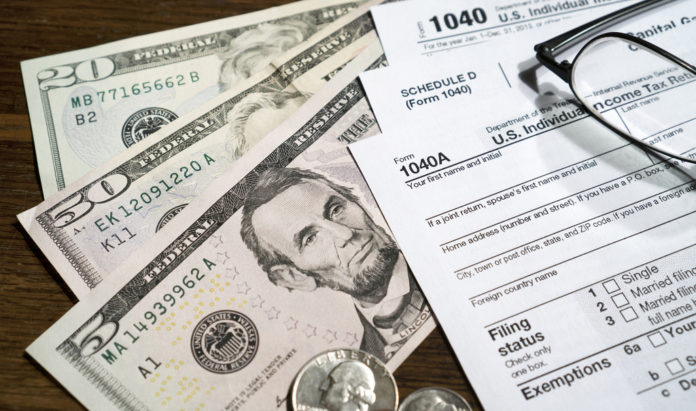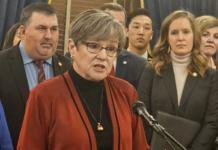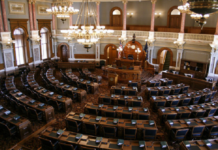The Kansas House on Tuesday approved a tax bill that could cost the state treasury almost $300 million over three years but is a less expensive alternative to a similar bill already passed by the Senate.
The House voted 81-43 to approve the bill after Republicans turned back a couple of attempts to remove the bill’s corporate provisions in favor of tax reductions targeting a less affluent and broader base of the population.
The House vote will leave it up to the Senate to agee with amendments or send it to a conference committee.
The House bill contains many of the same provisions of the Senate bill, including a measure allowing Kansans to itemize on their state income tax return if they don’t itemize on their federal return.
The bill also includes an exemption for income earned by foreign affiliates of U.S. companies from intangible assets such as patents, trademarks and copyrights.
The exemption for so-called global intangible low-taxed income is a controversial piece of similar legislation two years ago that the governor vetoed and Democrats have said would benefit multinational companies at the expense of working Kansans.
The federal government started taxing global intangible low-taxed income as a way of ensuring that a minimum level of foreign income tax is paid on the earnings of the foreign subsidiaries of U.S. parent companies.
Since Kansas is a so-called rolling conformity state with the federal tax code, the Legislature must act not to collect the tax.
Supporters of the provision argue that Kansas has not taxed foreign income previously and question why the state should collect the tax now.
Democratic Reps. Stephanie Clayton and Jerry Stogsdill targeted the corporate provision with separate amendments that would have replaced it with increasing the standard deduction and providing a refundable food sales tax credit.
Clayton of Overland Park offered up the refundable food sales tax proposal, which was voted down 78-44.
The state offered a refundable food sales tax credit from 1978 to 2012 when it was replaced by tax cuts that were signed into law under former Gov. Sam Brownback.
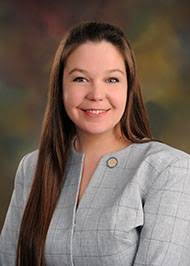
House Minority Leader Tom Sawyer said 450,000 Kansans claimed the food sales tax credit on their income taxes during the last year it was available in 2012.
Democrats portrayed the amendment as a choice between providing tax relief to large multinational companies that might not create jobs and a measure that would certainly benefit the state’s most vulnerable population.
“This provision that I am offering to you today does offer reassurance that not only will we be giving food sales tax relief to those in our districts who need it the most…(and) will be in line with most of our upbringing and our teaching to do right by those suffering the most,” Clayton told the House.
Republican state Rep. Pat Proctor of Leavenworth praised the intent of Clayton’s proposal, but said he didn’t think it went far enough for large employers.

“The best way to help our low-income residents is not to run businesses out of Kansas and not to discourage large businesses from coming to Kansas to provide jobs for those folks,” Proctor said.
“Bringing jobs and opportunity back to Kansas is the best way to help those folks who are struggling in our state,” the Leavenworth Republican said.
Democratic state Rep. Jerry Stogsdill tried to eliminate the corporate provisions with a proposal to increase the standard deduction. It was voted down 80-40.
Stogsdill wanted to increase the standard deduction for single filers from $3,000 to $4,250 and for married filers from $7,500 to $8,500.
He proposed increasing the standard deduction for the head of houshold from $5,500 to $6,500.

Stogsdill’s proposal was more generous than the House bill, which provides a $500 across-the-board increase in the standard deduction for all filers.
The bill that tentatively passed would increase the standard deduction to $3,500 for single filers, to $8,000 for married couples and to $6,000 for the head of household.
Stogsdill said his proposal was simply asking large companies to pay their fair share of taxes while helping ordinary Kansans.
Stogsdill’s proposal would have redirected about $71 million from tax savings intended for large companies to increasing the standard deduction.
“This is a statement piece for what we’re up here for,” the Prairie Village lawmaker said.
“They’re wondering: Are we up here to represent the best interests for large multinational corporations or are we up here to represent the interest of regular Kansans across this state,” he said
Republican state Rep. Adam Smith, chair of the House tax committee, said the “multinational corporation” phrase had become a catchword in the tax debate.
Smith, of Weskan, said that’s not necessarily bad.
“These businesses employ a lot of people in our state. They are very important,” said Republican state Rep. Adam Smith, chair of the House tax committee.
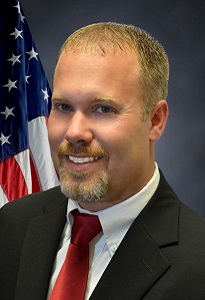
“I don’t know why we want to penalize them for being so successful that they have global operations,” Smith said.
The House bill is very different from Senate bill, which was priced at more than $1 billion over three years by the time it was passed.
The Senate bill started at about $175 million a year, but grew to $490 million after a series of amendments were added, including proposals that would exempt Social Security and retirment benefits from taxes.
The price tag of the new House bill is about $284 million for three years
The cost will partially be offset from $121 million raised by applying the state sales tax to marketplace facilitators where companies such as Amazon allow third-party retailers to sell goods and services on their website.






